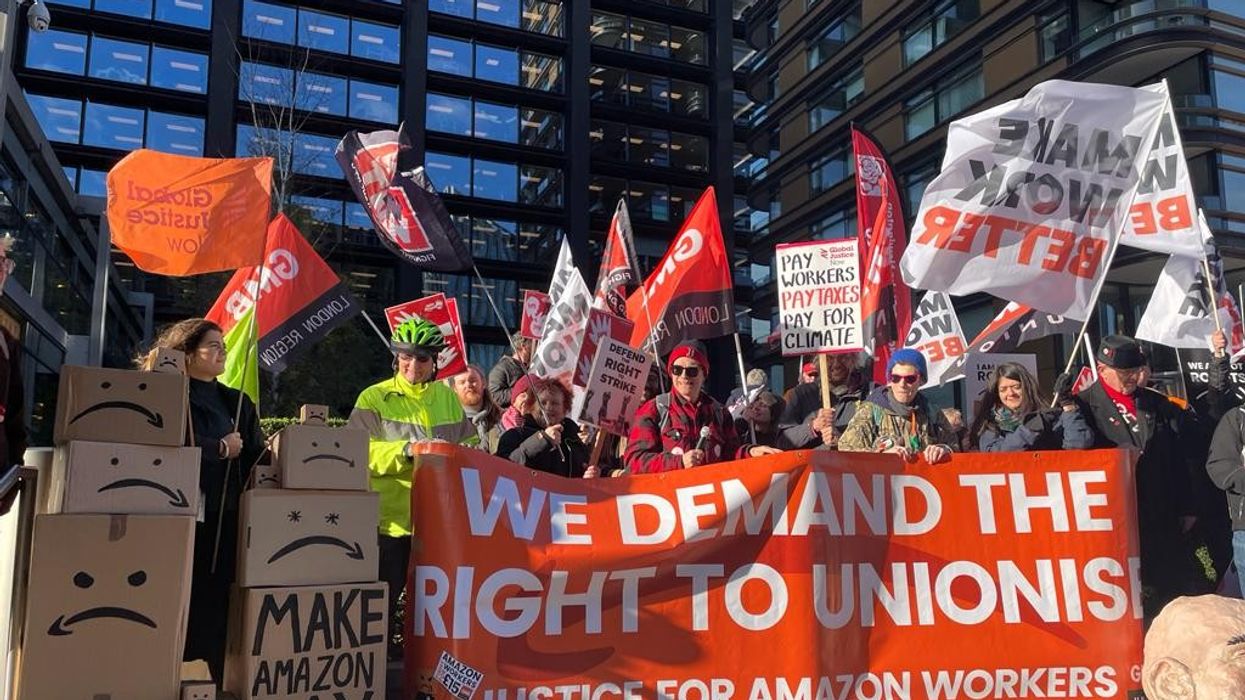How Amazon Exemplifies a Right-Wing Tax Code Rigged for Oligarchs Like Jeff Bezos
A new report makes clear "what's at stake by detailing the numerous ways Trump's tax code is designed to favor Amazon and its executives."
Few if any corporations in the United States better exemplify the rigged nature of the nation's tax code than the e-commerce behemoth Amazon, which throughout its history has made use of cavernous loopholes to avoid taxation and build massive wealth for its top executives—including founder Jeff Bezos.
In a new report titled "Amazon and Our Rigged Tax System," a coalition of advocacy organizations details how "corporate tax advantages have been essential to the company's rapid growth and increasing market dominance"—and examines how Republican plans for another round of tax cuts could further benefit the corporation and Bezos.
The report from the Institute for Policy Studies, Athena Coalition, and PowerSwitch Action notes that Amazon—described as a "perfect case study in what is wrong with our tax code"—has "used credits and loopholes to avoid paying even the sharply reduced" 21% statutory corporate tax rate established in 2017 by the Tax Cuts and Jobs Act (TCJA), which President Donald Trump signed into law early in his first term.
If Amazon had paid the 21% statutory corporate tax rate between 2018 and 2021, the company's federal tax bill during that period would have been $12.5 billion higher, the groups estimated.
But in 2018, the first year the TCJA was in effect, Amazon received more in federal tax credits than it paid in taxes, giving the company a negative federal tax rate.
Bezos, who stepped down as Amazon's CEO in 2021 but still serves as executive chairman, has also benefited substantially from the skewed U.S. tax code. The report estimates that Bezos, one of the wealthiest people in the world, "pocketed $6.2 billion as a result of the Tax Cuts and Jobs Act's failure to address the disparity in tax rates on income from wealth versus income from work."
"On his $36.7 billion in Amazon stock sales since that tax reform, Bezos owed only a 20% capital gains tax, far less than the 37% top marginal rate on ordinary income," the new report notes.
Andy Jassy, the company's current CEO, has "pocketed at least $6.6 million in savings over the past seven years thanks to the TCJA's reduction in the top marginal income tax rate," according to the new report.
"To stop autocracy, we need to challenge the corporations and billionaires behind and benefiting from oligarchy, not give them more tax breaks."
The report was published as Republicans in the U.S. Congress, with full support from President Donald Trump, work on tax legislation that's expected to renew individual provisions of the TCJA that would otherwise expire at the end of the year.
If the Republican-controlled Congress extends the soon-to-expire estate tax provisions of the TCJA—which doubled the federal estate tax exemption—"Bezos and Jassy's heirs would enjoy savings of $5.6 million," the new report estimates.
The advocacy groups said they produced the report out of "shared concern that a rising oligarchy is building an economy that bankrolls billionaires while leaving workers and small businesses behind."
"Right now, working families are bracing for drastic cuts to life-saving programs like Social Security, Medicaid, and Medicare and harmful slashing of pro-consumer regulations," the groups said. "Meanwhile, big corporations like Amazon and their executives stand to get even richer and more powerful through the huge tax breaks proposed by the administration and Congress. This fight has profound implications not only for Amazon and its executives, but for the balance of power in our economy."
Lauren Jacobs, executive director of PowerSwitch Action, said in a statement that "Amazon and Jeff Bezos have made billions squeezing every drop of profit they can out of our communities by breaking workers' bodies, poisoning our air, and sucking up public subsidies, and now they're selling out our fundamental freedoms."
"To stop autocracy," said Jacobs, "we need to challenge the corporations and billionaires behind and benefiting from oligarchy, not give them more tax breaks."
The report proposes a number of potential legislative solutions that it describes collectively as a "pro-worker and small business fair tax agenda."
Among the proposals are raising rather than cutting the statutory corporate tax rate and closing loopholes, imposing tax penalties on companies with massive CEO-to-worker-pay gaps, raising taxes on stock buybacks, and lifting the Social Security payroll tax cap to ensure the wealthy "pay their fair share into the system."
"This report highlights what's at stake by detailing the numerous ways Trump's tax code is designed to favor Amazon and its executives over the very workers and independent small businesses that have been hurt by Amazon," said Ryan Gerety, director of the Athena Coalition. "Over the next several months, we must stand together to protect public programs and oppose tax handouts to corporate billionaires like Andy Jassy and Jeff Bezos."


